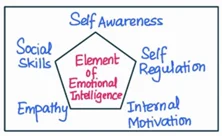Answer:
| Approach:
Introduction
- Define emotional intelligence.
Body
- Mention some points how emotional intelligence can help individuals
- Add examples to substantiate your arguments.
Conclusion
- Give prospective way ahead.
|
Introduction:
Emotional intelligence can certainly help individuals navigate a crisis of conscience without compromising their ethical or moral stand. Emotional intelligence refers to the ability to recognize, understand, and manage one’s own emotions, as well as the emotions of others.

Body:
Emotional intelligence can be particularly helpful during a crisis of conscience, where individuals may experience conflicting emotions, such as guilt, fear, and anger.
Emotional intelligence can help individuals in the following ways:
- Self-awareness: Emotional intelligence can help individuals become more self-aware of their own emotions and values. This can help them understand the root cause of their crisis of conscience and how it is impacting their decision-making.
- Self-regulation: Emotional intelligence can help individuals manage their emotions and impulses in a way that aligns with their ethical or moral stand. This can help them avoid making impulsive decisions that may compromise their values.
- Empathy: Emotional intelligence can help individuals understand the emotions and perspectives of others, including those who may be impacted by their decision. This can help individuals make decisions that are fair, just, and compassionate.
- Social skills: Emotional intelligence can help individuals develop effective communication and conflict resolution skills. This can help them navigate challenging conversations with others, such as those who may have conflicting opinions or interests.
Here some of the Examples:
- The Satyam Scandal: In 2009, the chairman of Satyam Computers, Ramalinga Raju, admitted to falsifying the company’s accounts and inflating its profits. The crisis of conscience faced by Raju could have been avoided if he had practiced emotional intelligence. By recognizing and managing his emotions, Raju could have made a different decision and avoided compromising his ethical stand.
- The Nirbhaya Case: In 2012, a young woman was brutally gang-raped in Delhi, which led to a widespread outrage across the country. The crisis of conscience faced by the public and the government officials could have been managed better if they had practiced emotional intelligence. By understanding and managing their emotions, the officials could have made decisions that were more empathetic towards the victim and the public.
- The Indian Army: The Indian Army is known for its high level of emotional intelligence. The soldiers are trained to manage their emotions and communicate effectively with their colleagues and the public. This has helped them navigate challenging situations, such as natural disasters and border conflicts, without compromising their ethical or moral stand.
Conclusion:
Emotional intelligence can be a valuable asset for public servants to navigate a crisis of conscience without compromising their ethical or moral stand. Therefore, developing emotional intelligence should be a priority for public servants to make ethical and moral decisions in challenging situations.
| Emotional Intelligence: Emotional Intelligence refers to the ability to recognize, understand, manage, and express emotions effectively, both in oneself and in others, while also utilizing emotions to guide thinking and behavior.
Examples:
- Indra Nooyi: Former CEO of PepsiCo, demonstrated empathy and strong interpersonal skills, fostering a collaborative work culture.
- Virat Kohli: Indian cricketer, exhibits emotional intelligence by maintaining composure, motivating teammates, and enhancing team dynamics.
|
